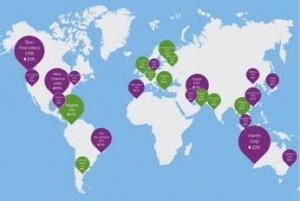Hotels.com lanches HPI report

According to the latest Hotels.com© Hotel Price Index™ (HPI®), a biannual report based on actual prices paid in 2012 compared with 2011, UK travellers faced price hikes in over half of the international destinations in 2012, despite a strong Pound Sterling. Of the 116 cities included in the report, prices were up in 63, flat in six and down in 47. Hotel rates overseas now look set to rise higher in 2013 as the Pound is weakened by the strengthening Euro and US Dollar, and the downgrading of the country’s AAA credit rating by ratings agency Moody’s.
However, UK travellers found money went further in many major European cities in 2012, as the Euro Crisis caused prices to fall. Athens suffered the biggest drop, with prices paid down by 10% to £72, with visitors put off by protests across Greece. Italy, which entered its fourth recession since 2001 last year, saw hotel rates in the capital of Rome fall by 9% to an average of £106 per night. With the Spanish economy shrinking by 1.4% in 2012, prices in Madrid fell by 8%, with UK travellers spending an average of £82 per night to stay in Spain’s capital city. The Netherlands also saw prices fall, with prices in the capital city of Amsterdam dropping by 8% to £106, as the country entered its third recession since 2009.
Hotel prices in London also dropped for domestic travellers, despite the summer of celebrations. With many Brits choosing to watch the Diamond Jubilee celebrations and Games at home and international visitors staying away due to concerns over inflated hotel prices and transport problems, UK travellers paid 7% less to stay in the capital in 2012 at an average £110 per night.
The USA was one of the big winners in the 2012 HPI, with UK travellers paying more in all 15 US destinations included in the report. The west coast saw some of the biggest rises, with prices in San Francisco growing by 20% to an average of £136. Seattle and Los Angeles both reached £125 following respective increases of 14% and 13%. Elsewhere, big rises were seen in Orlando, where prices gained 18% to £73, and New Orleans where the average price per night rose to £106, up by 16% on 2011.
Looking across the globe, 2012’s biggest riser was Sharm el-Sheikh, where prices were up by 34% to £92 as travellers’ confidence in the Middle East returned following the Arab Spring turmoil in 2011. Dubai was another big winner in 2012, with prices rising by 14% to £137, driven by high occupancy rates in the region’s most popular destination. However, the picture in Egypt’s capital was less than rosy though with the average price paid falling by 7% to £98 per night.
ADVERTISEMENT
Australia delivered some of the biggest price increases in 2012. Average prices in Perth shot up by 22%, the second highest rise in the HPI, - as the country’s mining boom and the resulting increase in business traffic forced up hotel prices. Healthy rises were also seen in Sydney, where prices jumped up by 8% to £128 per night and Melbourne, where prices hit £106, up by 7% on 2011.
Some of the biggest rises in Latin America were seen in Rio de Janeiro where UK travellers paid 13% more, as the average price per night rose to £177, driven up by increased demand from both business and leisure travellers and the country’s booming economy. With Rio playing host to the World Cup next year and the 2016 Olympics, the city looks set to attract even more tourists in the years ahead. However the impact of increased demand on hotel rates may be offset by an increase in supply as the city adds 25,000 extra hotel rooms over the next three years to meet demand during the 2016 Games, meaning that travellers will continue to find good value.
In Asia, some of the biggest increases were seen in Japan, as visitors returned following the 2011 earthquake, tsunami and nuclear emergency. Kyoto led the way with prices up by 16% to £105. Prices in Osaka were up 14% to £74 and up 6% in Tokyo to £109 per night. However, Asia’s biggest riser was Siem Reap, gateway to Cambodia’s Angkor region, which saw prices climb 17% to £51 per night.
Nigel Pocklington of Hotels.com said: “While the Eurozone crisis translated into better value city breaks for UK travellers in 2012, the Euro’s growing strength against the Pound could drive up UK prices this year. Although a weakening Pound is bad news for British holidaymakers wanting to travel abroad, the UK’s travel industry will welcome the news. A weaker Pound will make the country more appealing to overseas visitors, while boosting the number of Brits holidaying at home. With British designer goods effectively ‘on offer’, we’re hoping to see more visitors coming to the UK from the Middle East, Brazil, Japan and China in 2013, providing relief for the nation’s high streets.

